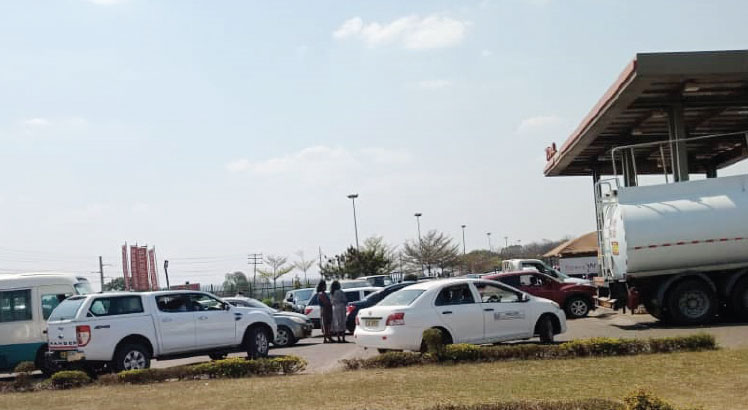Fuel queues resurface
Fuel shortages worsened in some parts of the country at the weekend, leaving some motorists stranded as others queued for hours to get the commodity. But authorities have played down the shortage and dismissed suggestions of a crisis.
Hard-hit areas included the capital city Lilongwe, Mzuzu, Nkhata Bay, Nkhotakota and Salima where motorists were seen enduring long queues, reminiscent of the era of former president Bingu wa Mutharika between 2010 and 2012, at the few service stations with stocks or where they got news there would be a possible delivery.
In the midst of the panic, some motorists were forced to buy from vendors who sold fuel at between K2 500 and K3 000 per litre.
In Blantyre, the impact was mild as some service stations only had petrol in stock while others had diesel only. There were also pockets of service stations with stockouts, but no long queues were seen. The old capital, Zomba did not experience the erratic supply, according to The Nation spot checks.

But Malawi Energy Regulatory Authority (Mera) and National Oil Company of Malawi (Nocma) yesterday denied that the country is facing a fuel crisis.
During a joint press conference in Lilongwe yesterday afternoon, the two entities confirmed fuel shortages in the capital city, but claimed that reports of scarcity of the commodity in other parts of the country such as Mzuzu, Salima, Nkhotakota and Nkhata Bay were not officially known to them.
Taking her turn, Nocma deputy chief executive officer Helen Buluma said one million litres of both diesel and petrol were being injected into the market from the strategic fuel reserves per day.
However, she could not say when Nocma started getting fuel from the reserves as well as the quantity of fuel remaining and how long the reserves may last.
Buluma said: “This is a situation that has happened mainly in Lilongwe and it is not a national crisis. Nocma is not looking at this as a national crisis, we are releasing the product from the reserves.
“I will not go into details of how much product we have been releasing from the reserves to date. We will continue to release in the next coming days and we are so sure that the Lilongwe situation should be tamed by the end of the day [yesterday].”
Malawi’s fuel reserves are located in Lilongwe, Blantyre and Mzuzu with a combined storage capacity of 60 million litres, estimated to represent two months or 60 days cover at the prevalent projected daily consumption levels.
Blantyre and Lilongwe reserves have a capacity of 25 million litres each while Mzuzu reserves hold 10 million litres. Nocma is set to embark on a project to double the storage capacity.
During the briefing, Buluma said TotalEnergies and Puma Energy service stations in Lilongwe were prioritised in yesterday’s deliveries and that the scarcity was expected to be contained by close of business yesterday.
She said the sporadic shortages had nothing to do with Nocma’s failure to import fuel, arguing that the State-owned company has been importing the product since January despite some challenges.
Buluma cited two factors that have undermined Nocma’s capacity to import, namely scarcity of forex and pricing of fuel on the international market worsened by the Russia-Ukraine war. She said the price of fuel on the global market has trebled since January this year.
Mera chief executive officer Henry Kachaje admitted that the country has been having slightly less than optimal fuel inflows at 75 percent.
He said the regulator was working closely with fuel importers, namely Petroleum Importers Limited (PIL) and Nocma to monitor volumes being imported on a daily basis and doing monthly consolidation.
Kachaje attributed the fuel shortages, particularly for Lilongwe, to activities such as the international football match between Malawi and Mozambique as well as an international artist’s performance in the capital city. He said such social activities make people move a little bit more, translating into increased consumption of fuel.
He said: “We also know that during such times, there is always the challenge of panic buying and also some vendors taking advantage of the situation to buy in bulk and sell to motorists at exorbitant prices.
“As Mera, we will ensure that this is not happening and we are assuring motorists that there is enough fuel available.”
In a telephone interview yesterday, PIL general manager Martin Msimuko indicated that the private oil marketing companies consortium this week brought into the country 81 petrol tankers and 31 diesel tankers carrying at least 35 000 litres each of the product.
The stocks, he said, may last about five days.
Msimuko admitted that PIL is struggling to get more foreign exchange to import more.
He said: “We are still grappling with forex challenges and establishing letters of credit with banks is still a struggle. As of September, we are yet to get the LCs [letters of credit].”
Malawi experienced its worst fuel crisis during Bingu’s administration. The crisis was largely attributed to foreign exchange crisis. During the era of founding president Hastings Kamuzu Banda, there was also a fuel crisis caused by disruptions resulting from the Mozambican civil war.






One Comment